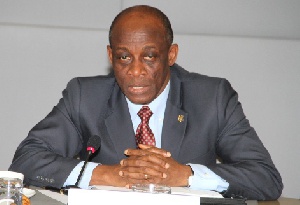Finance Minister Seth Terpker says government is effectively managing the country’s debt situation despite the fact that the country has hit the 70 percent debt-to-GDP level forecast by the International Monetary Fund (IMF).
The country’s total debt was about GH¢9 billion when the ruling National Democratic Congress (NDC) took over power from the previous NPP administration in January 2009 but the amount increased to GH¢94.5 billion as at July 2015.
Government continues to pride itself as the first to attract a recent loan over a 15-year period in sub-Saharan Africa outside South Africa.
Official figures as at May 2015 showed that Ghana’s total public debt grew by GH¢13.4 billion from the GH¢76.1 billion recorded in December 2014 to GH¢89.5 billion, representing some 67.1 percent of GDP.
Owing to the worrying situation, most State-owned enterprises (SOEs) are now required to borrow on their own strength without bothering government.
He argued that government’s new debt management strategy could improve the situation.
However, currently government has been spending GH¢10 billion to service debts every year.
The International Monetary Fund (IMF) said that if Ghana’s debt-to-GDP crosses the dreaded 70 percent mark by the end of the year, the country could be declared HIPC.
Instead of heeding advice of analysts and the opposition and employing alternative measures to stem the high expenditure by government to help bring the situation under control, the Finance Minister is in the media again giving assurances that the debt-to-GDP will begin to drop before the end of the year.
Speaking to an Accra-based Joy FM recently, he noted: “It is up to us as Ghanaians to prove the IMF wrong. Countries have proven the IMF wrong. It is up to us to say that we cannot continue borrowing for commercial projects, give it to SOEs (State Owned Enterprises) and they don’t pay back, that is how you end up at 70 percent, that is how you end up at 75 percent and that is how you end up being HIPC.”
He said the country’s debt increased because of new loans and disbursement of existing loans.
Government is also preparing to borrow more to service and re-service debts.
Recently, it issued a 3-year fixed rate bond to the general public to mobilize GH¢1.5 billion for the restructuring of government debt and also for maturity settlement after it floated a $1 billion (approximately GH¢3.8 billion) Eurobond on the international market which has already hit Bank of Ghana account.
Per its Issuance Calendar of Securities, government has planned to receive GH¢2.4 billion from its 91-day T-bills, GH¢800 million from 182-day T-bills, GH¢120 million from 1-year note, GH¢300 million from 2-year note and GH¢1 billion from 3-year fixed rate bond, all totaling GH¢4.62 billion this month.
In November, Government planned to collect GH¢2.4 billion from investors through its 91-day T-bills, GH¢1 billion from the 182-day T-bills, GH¢180 million through its 1-year note and GH¢300 million through the 2-year note.
For December, an amount of GH¢4.16 billion is expected from investors made up of GH¢3 billion in 91-day T-bills, GH¢800 million from 182-day T-bills, GH¢60 million in 1-year note and GH¢300 million in 2-year note.
Business News of Thursday, 22 October 2015
Source: Daily Guide
Terkper fights IMF over high debt
Entertainment
















